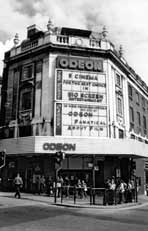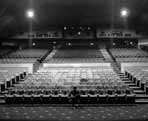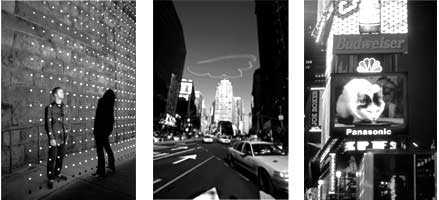|
SCALE - screens,
audiences and spaces
Venue : Odeon Cinema (Screen 1), The Headrow, Leeds
Date : Friday 12th October 2001
Time : 10.30am - 4.30pm
Price : £10/£7 (Click
here for booking information)

After examining the convergence of
gaming, film and interactive media in 1999 and 2000, the Evolution
conference will explore the idea of Scale and ask - How does the
narrative of a computer game transfer from a 20inch TV to a 30ft
cinema screen? What happens when mobile phones enable the public
to interact with public LED displays in Huddersfield? Does my refrigerator
really need an internet terminal?
From mobile phones, PDA's and laptops to monumental public screens
Evolution brings together an international selection of digital
pioneers to examine the impact of scale upon digital communications.
Evolution scratches the surface of the 'seamless' future of technology
to reveal that in a supposedly 'virtual' world, architecture, film
making, product design and the human body itself have never been
so important.
Evolution will locate these debates within the public architecture
of Leeds, from heritage buildings like the Queens Hotel to symbols
of Leeds' current growth, including Millennium Square and Harvey
Nichols. How does architecture and product design affect audience
reaction to digital content? How much of our experience of digital
media is based on our social environment? What is the difference
between watching a film in the dark with 300 strangers, playing
a computer game with 4 friends in your living room and reading a
text message from your lover on the train?
An audience of creative professionals, filmmakers, students, artists
and academics will explore these questions during a one day conference
presented against the backdrop of the Odeon's impending closure;
a fitting context for a discussion which will address changes in
audiences, technology and venues for interactive content. Housing
one of the largest projection screens in the north of England and
with a seated capacity of 1000, the venue will create a powerful
forum for a series of inspiring and thought-provoking presentations.
 

Matt Locke
Chair
Matt Locke is Creative Director of the Media Centre in Huddersfield,
responsible for developing research in creative uses of emerging
digital technologies. Current research activities are focused on
exploring social technologies and urban space, particularly developing
interfaces and content for mobile and architectural sites. Recent
projects include www.speakerscorner.org.uk - an innovative public
interface connecting the street, the web and SMS; Surrender Control
- a new narrative SMS project by Tim Etchells; and interaction development
for The Guardian's SMS Poetry Competition. In addition to developing
research projects, Matt writes and lectures regularly on issues
related to digital technologies and urban space, and teaches modules
on Visual Culture & Technology at Huddersfield University.
Speakers
Malcom Le Grice
After studying painting in Plymouth and at the Slade, Malcolm Le
Grice was one of those artists who, in the 60's experimented with
a wide range of media. He exhibited video and performance work in
the UK in 1967 and pioneering computer art which was exhibited through
the Computer Arts Society in 1970, but his main reputation as an
artist was initially gained as an experimental filmmaker. His earliest
films were amongst the first British work to make an impact internationally
through tours, exhibitions and festival screenings in Europe and
the USA. His work developed during the 70's and 80's to include
performance, multi-projections, works for TV and more recently an
exploration of video, digital and interactive computer systems.
His work is in national archives and private collections in Australia,
the USA and throughout Europe and has been shown at the Louvre,
the Centre Georges Pompidou, the New York Museum of Modern Art,
and the Tate and Hayward Galleries in London.
As well as his work as an artist, over the years Le Grice has published
widely on the history and theory of experimental film including
books, critical essays and recently theoretical articles on the
implication of digital technology on cinema. He has also been deeply
involved in the public cultural support for experimental film. He
was one of the founders of the London Filmmakers Co-operative Film
Workshop, the originator of the film department at St. Martin's
School of Art, and a member of funding committees of the British
Film Institute and the Arts Council of Great Britain.
In education he has been a member of committees for the Council
for Academic Awards, was a panel member for the Higher Education
Funding Council's Research Assessment Exercises in 1992 and 1996
and for the Research Assessment conducted by the Hong Kong Universities
Funding Council in 1994. After twelve years as Professor of Media
Arts and Head of Design and Media at the University of Westminster
he is currently Professor and Head of Research at the Central St.
Martins College of Art and Design of the London Institute.
Creative Time

Creative Time was founded 29 years ago - a time when artists around
America began to establish alternative arts organisations as a positive
response to their frustrations over the limitations of more traditional
exhibition venues. Almost immediately Creative Time became an international
leader in presenting new works by visual artists, performers, musicians,
poets, filmmakers, architects and choreographers in unlikely, under-explored,
and even abandoned public spaces. Today, they continue to work closely
with artists of all disciplines to bring cultural expression to
New York City's urban landscape while introducing the public to
cutting-edge contemporary art practices.
Anne Pasternak
Anne Pasternak is the Executive Director of Creative Time, a non-profit
public arts organisation dedicated to presenting new and experimental
works by artists of all disciplines. Before coming to Creative Time
in Fall 1994, Ms. Pasternak was the co-founder and director of BRAT,
an arts organisation committed to bringing innovative works of artistic
merit to the public realm. She has worked as an independent curator
and writer, served as a curator for Hartford's Real Art Ways where
she organised gallery exhibitions and public art programs of emerging
and under-represented artists, and managed contemporary gallery
spaces in both New York City and Boston. She curated the traveling
exhibition Garbage and has published articles in such journals as
Bomb Magazine, the Columbia Journal of American Studies, the Journal
of Contemporary Art and essays in select exhibition catalogues.

Carol Stakenas
Carol Stakenas is the Deputy Director and Curator of Creative Time,
New York City's multidisciplinary public arts presenter. Recently
she created and moderated the seminar series, Blur: New Creative
Practices in Developing Technologies, with Thundergulch, the New
School and Parsons School of Design which brought together artists,
curators and new technology experts to discuss the evolving nature
of cultural production and artists' uses of new technologies. In
addition to Creative Time, she is a Conjunction Arts board member
and is on the advisory committee for the International Film Seminar's
upcoming Digital Flaherty seminar to take place in Fall 2002 at
RPI. Until recently she served on the board of the National Association
of Artists Organizations (NAAO). In June 2000 she was the conference
chair of NAAO's 12th National Conference, Open Source: Networking
Artists and Artists Organisations. She was the web advisor to School's
Out: The Naming Project to initiate their on-line activities and
has also curated several exhibitions including Lo-Fi Baroque at
Thread Waxing Space.
François Penz
François Penz is Cambridge University Moving Image Studio (CUMIS)
Director and teaches in the Department of Architecture where he
runs courses on 'Architecture and the moving Image'. He is co-editor
of the book 'Cinema & Architecture' with topics ranging from a careful
scrutiny of early films with special architectural interest (Early
Images of the City) through reflections on how the representation
or creation of the city on the cinema screen feeds back into architectural
practice and vice-versa (The Modern City), to the ways in which
development in computer science are bringing about new alliances
between cinematic and architectural vision and practice (The Virtual
City). He has organised a number of 'Architecture Film' seasons
at the Arts Cinema. He is a fellow of Darwin College and a founder
Director of Cambridge Architectural Research Ltd.
Tom Loosemore
Tom Loosemore is currently Head of Broadband and New Platforms at
the BBC, developing the corporation's future strategy for a diverse
range of content and delivery platforms. Previous to this, Tom was
Applications Development Director for Chello Broadband, the biggest
broadband interactive service outside of the USA and has held key
positions in organisations such as Wired magazine, BBC online, AZTEC
and Capital Interactive. In his spare time, Tom is part of the team
that developed the ground-breaking www.faxyourmp.com, winner of
the BT Overall Merit award at the 2001 New Statesman New Media Awards.
|